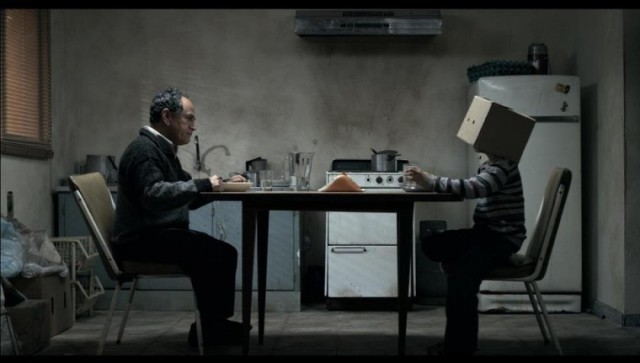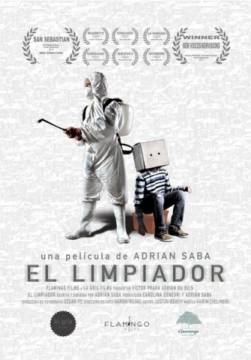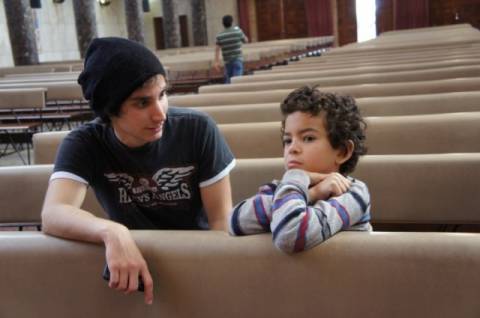 Víctor Prada, Adrián Du Bois in THE CLEANERMan and boy on the edge of dying Lima
Víctor Prada, Adrián Du Bois in THE CLEANERMan and boy on the edge of dying LimaIn Peruvian filmmaker Adrian Saba's sad but sweet feature debut
El limpiador (
The Cleaner), a mysterious respiratory illness has already swept away half the population of Lima, especially the grown men. The children are spared. Saba adopts the low budget sci-fi device of representing disaster by absence and silence, broken by white noise. In the grim, rudimentary flat of the Buster Keaton-faced Eusebio Vela (Victor Prada), a "forensic cleaner," who sweeps up human remains and infected areas, there is always the sound of barking dogs outside. Elsewhere there is the sound of the sea or occasional passing cars. In the course of his work Eusebio rescues a quiet, soulful boy called Joachim (Adrián Du Bois) whose mother has just died and whose father was already absent. What to do with him? At first Eusebio moves Joachim around like an offending object. He makes a box for him to protect his head, a semi-comic effect. The spirit of Samuel Becket has mated with Charlie Chaplin. Can a movie be both grim and charming?
The Cleaner strikes a meditative mood. It's surely not for everyone, but it's memorable and a promising debut indeed for young Saba, the son of a Peruvian father and Dutch mother who was born in Madrid.
In the opening scene a young man stands below an overpass smoking a cigarette, then throws himself in front of a car. This is as fancy as the effects get. No need to show the collision. Eusebio sees the report on TV, but we don't even need to see a TV screen; we just hear the announcer. This is a minimalist method in which every little thing has to be just right and Saba proceeds slowly and meticulously, wasting nothing. The result is a poem of solitude and dead-end love.
Much use is made of empty places, a whole football field with only one other person besides Eusebio and Joachim, nice new subway cars that are empty or have one other person, deserted streets, everything depicted in a soothing yet ominous gray by DP César Fe. Sound, which fills in the background evocatively without elaborate staging, plays an important role. The white noise in the city, the barking dogs outside Eusebio's apartment, create a palpable sense of how oppressive and present emptiness is in a plague city.
Eusebio consults periodically with a city doctor who tells him this illness resembles one that ravaged London centuries ago but has not been heard of since. It is not a virus. "We will be in the history books," he says, referring to Lima.
Of course Eusebio is as empty inside as the ravaged city is without, but the boy he takes into his care is the one flower that makes the garden bloom. First he tries to turn him over to the city, but its shelters are all filled to capacity with the homeless and orphaned. He takes the boy to cemeteries to "find" his mother, a palliative gesture. The box breaks, and he finds Joachim a bicycle helmet to wear. There is something heartbreakingly cute about Joachim's willingness to wear the box and the helmet even to sleep. Progressively, Eusebio comes to love the boy. Awakened to a sense of family by trying to locate Joachim's surviving relatives, he visits his own father, who is alive but ill, and finally tells him that he wants him to know that because he is protecting a boy, he is "having a good time."
In
The Cleaner, it's hard to separate inner and outer landscapes. This very imaginary place ultimately seems much more real than the ostensibly realistic spaces of Soderbergh's superficially so very informative but ultimately empty and clueless film about government handling of a global plague
Contagion, a theme already treated far more resonantly in Alfonso Cuarón's
Children of Men. Saba approaches the apocalyptic genre with a whimsical and lyrical touch and makes it about loneliness and love. His dry, slightly comical approach avoids any trace of sentimentality.
El limpiador debuted 26 September 2012 at the Biarritz Film Festival, and has since been at San Sebastian, Palm Springs, and other festivals including Chicago and Fribourg. It won the New Voices/New Visions Grand Jury Prize and New Directors Award - Special Mention at Palm Springs. It was screened for this review as part of the San Francisco International Film Festival (25 April-9 May 2013).
The Cleaner received Honorable Mention in the New Directors feature competition at the San Francisco International Film Festival.

]
. . . . . _____________________________________________ADRIAN SABA AND ADRIAN DU BOIS
_____________________________________________ADRIAN SABA AND ADRIAN DU BOIS




